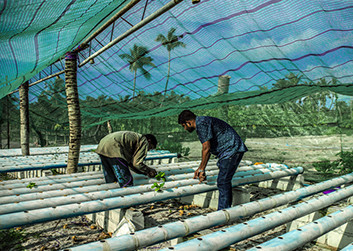 Across South Asia, renewable energy investment opportunities exceed $410 billion through 2030. © Shutterstock.com
Across South Asia, renewable energy investment opportunities exceed $410 billion through 2030. © Shutterstock.com
Urbanization in India is happening so rapidly that it’s literally impossible to visualize: half of the cities the nation will need in 2030 are not yet built. But when construction begins, these properties will more likely attract lenders, builders, and buyers if they include features such as energy- and water-efficient systems.
Read / Download Report
» Climate Investment Opportunities in South Asia - An IFC Analysis

Climate-smart agriculture is a key priority for the Maldives,
which is developing systems to protect crops.
© IWRM AIO SIDS
Overall, India’s new green-building market presents a $1.4 trillion investment opportunity—and that’s just part of South Asia’s $3.4 trillion potential for climate-smart investment, according to a new IFC analysis. Climate Investment Opportunities in South Asia offers a detailed look at how the private sector can fulfill these opportunities across Bangladesh, Bhutan, India, the Maldives, Nepal, and Sri Lanka.
The report examines how the region’s nascent “green” markets can unlock trillions in investment. Focusing on options by key sectors and by country, the in-depth analysis shows how creating markets for climate-resilient urban infrastructure—including water and waste management, climate-smart agriculture, renewable energy, sustainable transport, and green and resilient buildings, among others—can transform the region’s future.
Urbanization Spurs Climate-Smart Investment
IFC is already working to enable climate-related investments. For example, IFC’s Excellence in Design for Greater Efficiencies (EDGE) is a green-building certification system that is fulfilling the needs of a growing population. In just one year after launch, about 20,000 housing units and 10 million square feet of newly built commercial space fulfilled EDGE standards. As India’s success with EDGE demonstrates, climate investment opportunities are growing where numbers of city-dwellers are rising—and this is the case throughout South Asia.
In Sri Lanka, officials plan a public-private partnership (PPP) to develop a light-rail transit system to cover Colombo and its suburbs. This will help address growing transport demand in the area and encourage a shift from private to public transport.
The IFC report also identifies specific, untapped areas with potential—such as urban wastewater and agriculture in Bangladesh, hydropower and electric vehicles in Bhutan, the climate-proofing of infrastructure in the Maldives, increased production of local crop varieties in Nepal, and municipal solid-waste management, and climate-smart urban wastewater in Sri Lanka.
Key Transition Period for Private Investment
Across the six countries profiled in IFC’s new report, climate-business activity in renewable energy—another important area for growth—has already increased since the Paris Agreement was adopted in 2015. Between 2014 and 2016, when the agreement came into force, installed capacity of renewable energy increased by 18 percent to 100 gigawatts across Bangladesh, India, and Nepal
Those figures show climate investment opportunities are now significant. IFC’s survey of businesses in the region shows how far industry sentiment has shifted in this direction: over 85 percent of participating businesses responded that they are either very concerned or concerned about the impacts of climate change. Many are already optimizing planning and investing in new business models.
Investors are also demanding it. A survey commissioned by HSBC showed that more than two-thirds of institutional investors are planning to increase investments in tackling climate change, confirming that green finance is moving into the mainstream of global markets.
More Countries, More Markets
The new IFC report expands on an analysis published last year. As more nations participate in the creation of new climate markets, they’re added to IFC’s study; as new sectors such as electric vehicles become viable, they too are included. In India’s case, the estimate for climate-smart investment potential has grown to encompass electric vehicles, urban water, and climate-smart agriculture—areas not covered in the 2016 analysis.
The report indicates that a comprehensive approach to creating markets for climate business across sectors is the next step forward. This involves establishing regulatory and policy frameworks, promoting competition and innovation, achieving demonstration effects that encourage replication, and building capacity and skills to open new markets. This broad framework must be tailored to sector and country-specific conditions.
Read more about IFC’s work in climate at www.ifc.org/climatebusiness.
Published in November 2017